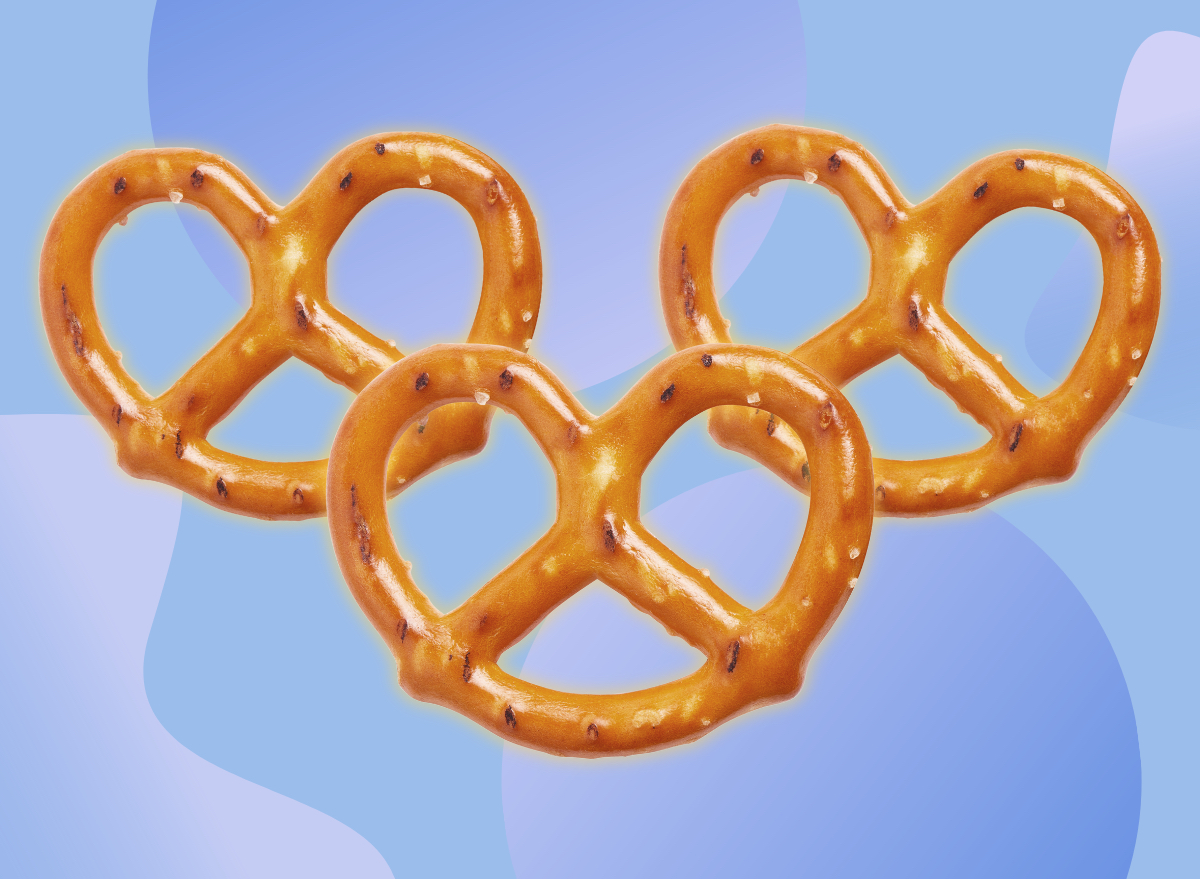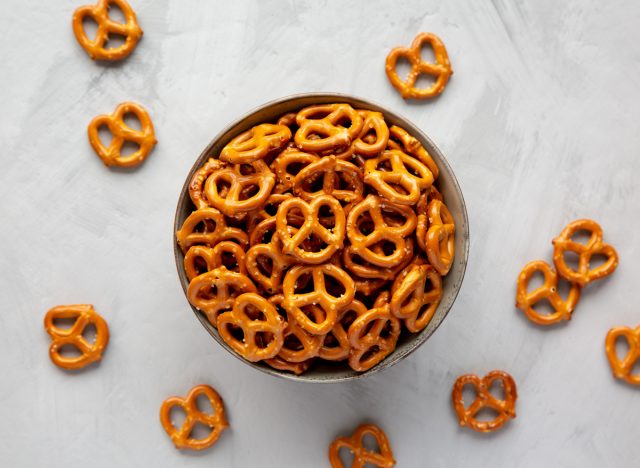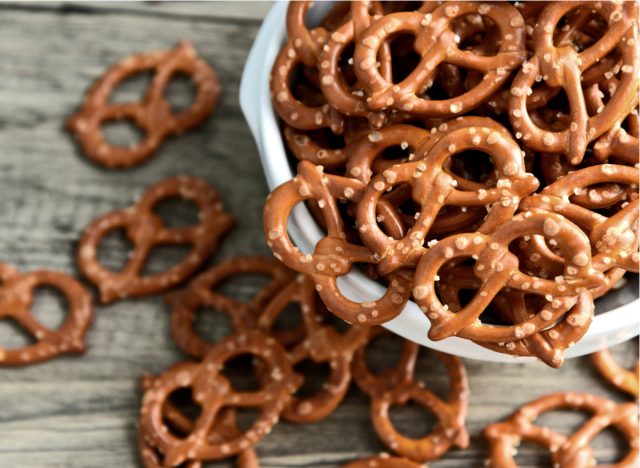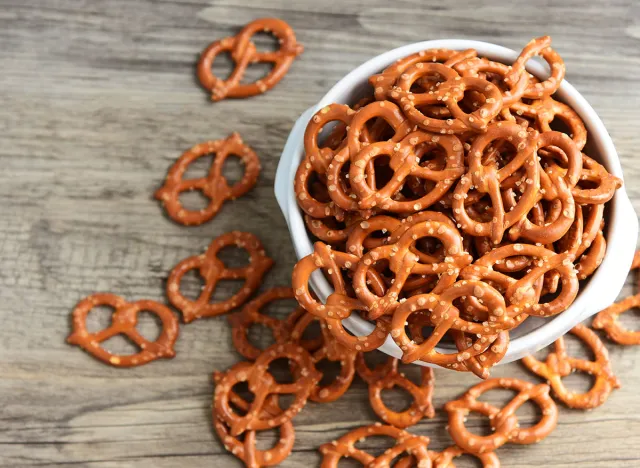Are Pretzels Healthy? We Asked a Dietitian

When you're craving something salty, pretzels really hit the spot. They're crunchy and pair well with just about anything. Many people consider pretzels a healthier option than high-fat snacks like potato chips. But are pretzels actually healthy?
As a dietitian, I'm here to tell you that pretzels can be part of a healthy diet. This article will review their benefits and drawbacks and how to enjoy them even if you have certain health concerns.
What Are Pretzels Made Of?

Pretzels are shiny, brown, flour-based yeast snacks twisted into knots before baking. They come in various flavors and textures. Some are filled with peanut butter or cheese, while others are dipped in chocolate or topped with different coatings. The basic ingredients are flour, yeast, salt, butter or shortening, sugar, and water. Unlike fermented bread, pretzels are meant to be dense, so they aren't left to rise.
The process of making pretzels involves several key steps. Commercial pretzels are dipped in a warm lye bath for 10-25 seconds before baking. This sodium hydroxide solution gives pretzels their characteristic color and flavor. Homemade pretzels can be boiled for 20-30 seconds before baking. After this, they are sprinkled with salt and baked for 12-15 minutes.
Nutritional Profile of Pretzels
Pretzels are a great source of carbohydrates and are low in fat; however, this snack is low in protein.
Calories: 230
Fat: 1 g (Saturated fat: 0 g)
Sodium: 744 mg
Carbs: 48 g (Fiber: 2 g, Sugar: 1 g)
Protein: 6 g
Calories: 206
Fat: 1 g (Saturated fat: 0 g)
Sodium: 116 mg
Carbs: 46 g (Fiber: 4 g, Sugar: 1 g)
Protein: 6 g
The nutritional value of pretzels can vary depending on their ingredients and preparation method.
Pretzels made with enriched wheat flour contain more fiber and nutrients, such as iron, B vitamins (thiamin, riboflavin, and niacin), and calcium, compared to those made with white flour. Pretzels can also be filled or coated, which affects their calorie and fat content
Health Benefits of Pretzels

You'll Have More Energy
Carbohydrates are the body and brain's preferred fuel source. Pretzels are simple carbohydrates, which means they digest more quickly, providing an almost immediate energy boost. When you eat carbs, your body breaks them down into glucose, raising blood sugar levels and triggering the pancreas to release insulin. Insulin helps transport glucose from the bloodstream to cells for energy. Without the rise in blood sugar, there'd be no way to get the nutrients and energy you need from your food.
You'll Get More Fiber
A 2-ounce (57-gram) serving of wheat pretzels provides 4 grams of fiber, more than 10% of the daily recommended intake of 25-30 grams. Choosing a fiber-rich dip like hummus or guacamole adds another 2 grams of fiber per 2-tablespoon serving.
Fiber is the undigestible portion of plant foods and carbohydrates. Unlike simple carbs, when you eat fiber-rich whole grains, fruits, and vegetables, your blood sugar rises more slowly, providing a more stable release of energy and nutrients. That's because it takes longer for fiber to move through the digestive tract. This helps you feel full and satisfied longer, helping you stop eating when you're full.
You'll Meet Vitamin and Mineral Needs
Compared to regular white flour, pretzels with enriched wheat flour may have more iron, B vitamins, and calcium. That's because the vitamins and minerals stripped from the grain during the milling process are put back in to restore the nutritional value of the original product. This can help fill in the gaps when dietary sources of these nutrients aren't always available.
Since 1996, the FDA has required folic acid enrichment in refined flours, making wheat pretzels a good source of folate, essential during pregnancy for preventing neural tube defects.
Potential Drawbacks of Pretzels

While there are some benefits to eating pretzels, there may be some drawbacks to consider. Pretzels can be high in sodium, which can be dangerous for those with a history of cardiovascular disease. They're not inherently gluten-free, which is a concern for someone with a gluten allergy or celiac disease. And their high carbohydrate content, compounded with very little protein, fat, and fiber, means someone with type 2 diabetes or insulin resistance should exercise caution.
You May Consume Excess Sodium
Pretzels' salty nature is a big part of their popularity. Without a sprinkle of sea salt, pretzels leave much to be desired. On the same note, salt can be a problem for people with a history of cardiovascular disease or hypertension.
One 10-twist serving has 744 milligrams of sodium. That's 32% of the recommended 2,300 milligrams of sodium per day, and 1,500 milligrams per day for those with a history of CVD or hypertension. Studies have found that for every 1,000 milligram reduction in daily sodium, you reduce your cardiovascular risk by 6%.
While nobody should avoid salt or sodium altogether, choosing low-sodium or no-salt-added pretzels is better for those with a medical reason to limit their sodium intake. Remember that sodium is an electrolyte, and ditching it outright could cause major problems with fluid balance and homeostasis. If you're considering a low-sodium diet, talking to your doctor can help you determine whether this is a healthy choice.
Your Blood Sugar May Spike Too High
Pretzels have a high glycemic index (GI). High GI foods are digested and absorbed into the bloodstream quickly causing a rapid spike in blood sugar. This can be a challenge for those with type 2 diabetes, pre-diabetes, or insulin resistance. When blood sugar rises too high quickly, it leads to a drastic drop and can leave you feeling sluggish and hungry shortly thereafter. If this happens frequently and is left untreated, it can lead to health problems, including heart disease, kidney problems, eye disease, and obesity.
Pairing pretzels with low glycemic index foods, such as those rich in dietary fiber and protein, can help flatten the blood glucose curve. Instead of munching on pretzels alone, pair them with nuts, cheese, or your favorite dip.
They're Not Generally Gluten-Free
Pretzels are not gluten-free and can trigger adverse reactions in individuals with celiac disease or gluten sensitivity. When someone with celiac disease consumes food products that contain gluten, their body signals an inappropriate immune response, causing small intestinal inflammation and damage. Symptoms include lethargy, diarrhea, abdominal pain, vomiting, and constipation. People with these conditions should consult a doctor or dietitian for gluten-free diet guidance.
Are Pretzels Healthy?
Despite popular belief, pretzels can be a nutritious part of a healthy diet. While pretzels made with white flour might be a concern for those with heart disease, high blood sugar, insulin resistance, or celiac disease, you don't have to ditch them completely. Traditional white flour pretzels are high in carbohydrates and low in nutritional value, but eating them with more nutritious foods can balance out the benefits and drawbacks. Choosing whole grain, enriched pretzels can add fiber, vitamins, and minerals like iron and B vitamins to your diet.
Tips for Choosing Healthy Pretzels
Today's food manufacturers are improving pretzels to make them healthier. When shopping for healthy pretzels, consider your health needs, flavor preferences, and the nutritional profile of the available products.
- Low-sodium: Look for products labeled as low-sodium or no-salt-added to avoid consuming too much sodium in one sitting.
- Gluten-free: If you have celiac disease or need to avoid gluten, choose gluten-free pretzels. Always read the ingredients list to ensure there's no hidden gluten.
- Whole-grain: Opt for whole-grain or whole-wheat pretzels for a better dose of fiber, vitamins, and minerals that help maintain a healthy body.
How To Incorporate Pretzels into a Healthy Diet

- Follow portion sizes: Check the label for appropriate portion sizes. If you're unsure, serving yourself about 1 cup (or the size of your fist) is a great start.
- Pair with nutrient-dense dips: Serve pretzels with dips rich in fiber, fat, or protein, such as hummus, guacamole, or tzatziki. These pairings help you stay full longer and stabilize your blood sugar levels.
- Create a balanced snack: Add pretzels to trail mix or pair them with charcuterie items like nuts, seeds, popcorn, and cheese. This turns a carb-heavy snack into a more balanced one.
- Enjoy what you eat: Choose a pretzel you enjoy because nourishing your mind is also a healthy part of eating.
Luckily, there are plenty of options for all taste preferences. Some of my favorite pretzels include Snack Factory Pretzel Crisps, perfect for dipping; FitJoy Grain-Free pretzels, a gluten-free option; and BeyondTwistz pretzels, which contain 4 grams of fiber per serving.
- Source: https://www.sciencedirect.com/science/article/abs/pii/S2214799318301036?via%3Dihub
- Source: https://pubmed.ncbi.nlm.nih.gov/34569737/
- Source: https://pubmed.ncbi.nlm.nih.gov/29083823/
- Source: https://www.ncbi.nlm.nih.gov/books/NBK459280/#:~:text=As%20carbohydrates%20are%20consumed%2C%20the,liver%20to%20release%20stored%20glucose.
- Source: https://fdc.nal.usda.gov/fdc-app.html#/food-details/167965/nutrients
- Source: https://www.ncbi.nlm.nih.gov/pmc/articles/PMC9298262/
- Source: https://fdc.nal.usda.gov/fdc-app.html#/food-details/321358/nutrients
- Source: https://fdc.nal.usda.gov/fdc-app.html#/food-details/2344802/nutrients
- Source: https://pubmed.ncbi.nlm.nih.gov/32142510/
- Source: https://www.ncbi.nlm.nih.gov/pmc/articles/PMC3257747/
- Source: https://www.ncbi.nlm.nih.gov/pmc/articles/PMC3218540/
- Source: https://fdc.nal.usda.gov/fdc-app.html#/food-details/167555/nutrients
- Source: https://www.ncbi.nlm.nih.gov/pmc/articles/PMC8468043/
- Source: https://www.ncbi.nlm.nih.gov/pmc/articles/PMC7601012/
- Source: https://www.ncbi.nlm.nih.gov/pmc/articles/PMC7601012/
- Source: https://glycemic-index.net/snacks-pretzels-hard-plain-salted/
- Source: https://www.ncbi.nlm.nih.gov/pmc/articles/PMC7352659/
- Source: https://www.ncbi.nlm.nih.gov/books/NBK430900/
- Source: https://www.ncbi.nlm.nih.gov/pmc/articles/PMC10746079/
- Source: https://www.ncbi.nlm.nih.gov/books/NBK441900/#:~:text=Celiac%20disease%2C%20also%20known%20as,small%20intestinal%20inflammation%20and%20damage.









